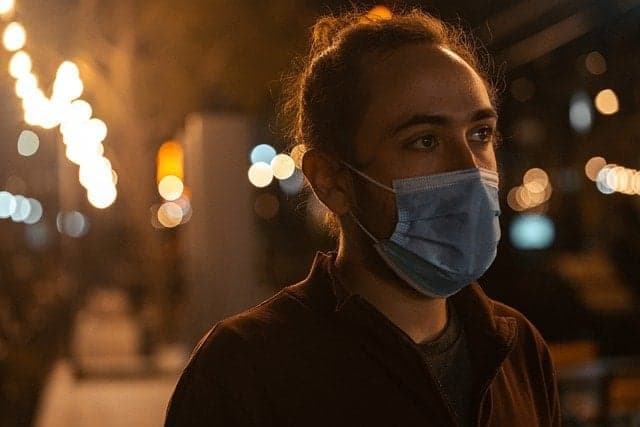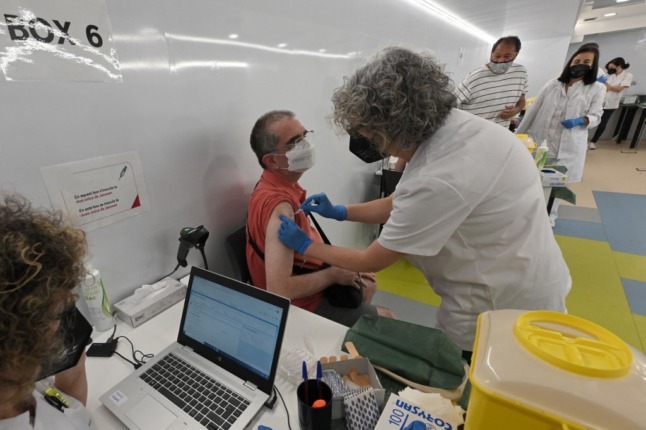Do vaccinated people in Spain who may have Covid-19 need to self-isolate or get tested?

A growing number of people who’ve been fully vaccinated are getting infected with Covid-19. But what are the rules for vaccinated citizens who’ve come into contact with a positive case or who have symptoms? And how about if they’ve only had one vaccine?
On July 18th, Madrid health authorities reported that around 5 percent of patients who were being admitted to the city’s Zendal Hospital had received their complete vaccination.
According to the head of Spain’s Immunological Society (SEI), the national percentage who contract Covid despite full inoculation will be much lower - 0.1 percent - which highlights how effective vaccines are proving to be in protecting us against the coronavirus.
"We’re talking about 23,000 people who will be infected or reinfected in Spain despite being immunised (not including children under 12),” Marcos López Hoyos told Spanish news site Vozpopuli.
So what does a person who has received either one or two doses have to do if they’re exposed to a positive case or they have symptoms?
By fully vaccinated we mean two doses of the Pfizer, Moderna and AstraZeneca inoculations and one dose of the Johnson & Johnson vaccine.
Do fully vaccinated people who may have been exposed to a positive case have to quarantine?
On June 23rd, Spain’s Health Ministry revised its Covid-19 prevention strategy to allow those who have been fully vaccinated to not have to quarantine for ten days if they come into contact with a positive case.
“People who are fully vaccinated and considered a close contact of a positive Covid-19 case will generally speaking be exempt from quarantine,” Spain’s Health Ministry and the country’s Public Health Commission said at the time.
A “close contact” refers to a person who has been fewer than two metres from someone who tested positive for Covid-19, for longer than 15 minutes in a day.
Even though they will not have to quarantine for ten days as was the case previously, they will have to take two Covid tests (PCR or antigen), the first as soon as they’ve found out about the positive case and another seven days after the exposure.
And if it comes back positive, they will have to self-isolate.
Spain has recently allowed self-test kits to be sold at pharmacies without prescriptions, so this can reduce costs even though they’re considered less effective in asymptomatic people.
READ MORE: What you need to know about Spain’s new Covid self-test kits
Spanish health authorities also recommend that they still “avoid contact with vulnerable people and people who haven’t been vaccinated” for that period.
As things stand, fully vaccinated people have a very low chance of suffering serious health complications if they contract Covid-19 again, but they can still be carriers of the virus and infect others.
Spain’s Health Ministry has also insisted that immunised people who have been exposed should continue wearing a facemask during “social interactions”, even though the country lifted the outdoor face mask rule on Saturday June 26th.
They are also asked to avoid going to crowded events or places and to closely monitor possible symptoms.
At a later date in June, Spanish health authorities argued that if the close contact is infected with a variant other than the Alpha variant (and Delta is now dominant in most of Spain), the fully vaccinated person should quarantine as there’s a “greater risk of immunological escape”.
 Photo: LLUIS GENE / AFP
Photo: LLUIS GENE / AFP
Do fully vaccinated people who have Covid-19 symptoms have to quarantine?
It depends on whether the Covid test comes back positive.
Vaccinated people will still be considered as suspicious cases as soon as they display symptoms compatible with Covid-19, so they will be treated as if they were suspicious.
They must therefore undergo a Covid test and if it comes back negative, it’s recommended that they repeat the test.
If the result comes back negative again but there’s still a high clinical suspicion due to symptoms displayed, an antibodies test can be carried out to differentiate between an immune response due to natural infection or vaccination to guide the diagnosis.
What happens if a fully vaccinated person in Spain tests positive for Covid-19?
Fully vaccinated people who test positive should quarantine and self-isolate for ten days, just as if they had not been vaccinated.
What should a person who’s had only one vaccine dose do if have contact with a positive case or have symptoms?
People who have received only one of the two doses needed for the Pfizer, Moderna and AstraZeneca inoculations will have to self-isolate in both scenarios: if they’ve come into close contact with a positive case or if they’ve developed symptoms.
According to Spain’s vaccination strategy website, the optimal protection of the vaccines currently authorised in Spain is obtained 7 to 28 days after receiving the second dose”, so health authorities treat these cases the same almost as if you weren’t vaccinated at all.
And what about if your appointment for your second vaccine is coming up?
“If you are a person over 65 years of age, you should wait until recovery and the end of the isolation period and then the second dose will be administered, provided that at least the established period between doses has passed.
“In the case of a person 65 years of age or younger, they should wait six months to complete their vaccination treatment with the administration of the second dose."
READ ALSO: What to do in Spain if you think you have Covid or have come into contact with a positive case
Comments
See Also
On July 18th, Madrid health authorities reported that around 5 percent of patients who were being admitted to the city’s Zendal Hospital had received their complete vaccination.
According to the head of Spain’s Immunological Society (SEI), the national percentage who contract Covid despite full inoculation will be much lower - 0.1 percent - which highlights how effective vaccines are proving to be in protecting us against the coronavirus.
"We’re talking about 23,000 people who will be infected or reinfected in Spain despite being immunised (not including children under 12),” Marcos López Hoyos told Spanish news site Vozpopuli.
So what does a person who has received either one or two doses have to do if they’re exposed to a positive case or they have symptoms?
By fully vaccinated we mean two doses of the Pfizer, Moderna and AstraZeneca inoculations and one dose of the Johnson & Johnson vaccine.
Do fully vaccinated people who may have been exposed to a positive case have to quarantine?
On June 23rd, Spain’s Health Ministry revised its Covid-19 prevention strategy to allow those who have been fully vaccinated to not have to quarantine for ten days if they come into contact with a positive case.
“People who are fully vaccinated and considered a close contact of a positive Covid-19 case will generally speaking be exempt from quarantine,” Spain’s Health Ministry and the country’s Public Health Commission said at the time.
A “close contact” refers to a person who has been fewer than two metres from someone who tested positive for Covid-19, for longer than 15 minutes in a day.
Even though they will not have to quarantine for ten days as was the case previously, they will have to take two Covid tests (PCR or antigen), the first as soon as they’ve found out about the positive case and another seven days after the exposure.
And if it comes back positive, they will have to self-isolate.
Spain has recently allowed self-test kits to be sold at pharmacies without prescriptions, so this can reduce costs even though they’re considered less effective in asymptomatic people.
READ MORE: What you need to know about Spain’s new Covid self-test kits
Spanish health authorities also recommend that they still “avoid contact with vulnerable people and people who haven’t been vaccinated” for that period.
As things stand, fully vaccinated people have a very low chance of suffering serious health complications if they contract Covid-19 again, but they can still be carriers of the virus and infect others.
Spain’s Health Ministry has also insisted that immunised people who have been exposed should continue wearing a facemask during “social interactions”, even though the country lifted the outdoor face mask rule on Saturday June 26th.
They are also asked to avoid going to crowded events or places and to closely monitor possible symptoms.
At a later date in June, Spanish health authorities argued that if the close contact is infected with a variant other than the Alpha variant (and Delta is now dominant in most of Spain), the fully vaccinated person should quarantine as there’s a “greater risk of immunological escape”.
 Photo: LLUIS GENE / AFP
Photo: LLUIS GENE / AFP
Do fully vaccinated people who have Covid-19 symptoms have to quarantine?
It depends on whether the Covid test comes back positive.
Vaccinated people will still be considered as suspicious cases as soon as they display symptoms compatible with Covid-19, so they will be treated as if they were suspicious.
They must therefore undergo a Covid test and if it comes back negative, it’s recommended that they repeat the test.
If the result comes back negative again but there’s still a high clinical suspicion due to symptoms displayed, an antibodies test can be carried out to differentiate between an immune response due to natural infection or vaccination to guide the diagnosis.
What happens if a fully vaccinated person in Spain tests positive for Covid-19?
Fully vaccinated people who test positive should quarantine and self-isolate for ten days, just as if they had not been vaccinated.
What should a person who’s had only one vaccine dose do if have contact with a positive case or have symptoms?
People who have received only one of the two doses needed for the Pfizer, Moderna and AstraZeneca inoculations will have to self-isolate in both scenarios: if they’ve come into close contact with a positive case or if they’ve developed symptoms.
According to Spain’s vaccination strategy website, the optimal protection of the vaccines currently authorised in Spain is obtained 7 to 28 days after receiving the second dose”, so health authorities treat these cases the same almost as if you weren’t vaccinated at all.
And what about if your appointment for your second vaccine is coming up?
“If you are a person over 65 years of age, you should wait until recovery and the end of the isolation period and then the second dose will be administered, provided that at least the established period between doses has passed.
“In the case of a person 65 years of age or younger, they should wait six months to complete their vaccination treatment with the administration of the second dose."
READ ALSO: What to do in Spain if you think you have Covid or have come into contact with a positive case
Join the conversation in our comments section below. Share your own views and experience and if you have a question or suggestion for our journalists then email us at [email protected].
Please keep comments civil, constructive and on topic – and make sure to read our terms of use before getting involved.
Please log in here to leave a comment.